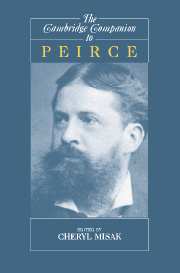Book contents
- Frontmatter
- 1 Charles Sanders Peirce (1839-1914)
- 2 Peirce's Place in Pragmatist Tradition
- 3 Peirce and Medieval Thought
- 4 Reflections on Inquiry and Truth Arising from Peirce's Method for the Fixation of Belief
- 5 Truth, Reality, and Convergence
- 6 C. S. Peirce on Vital Matters
- 7 Peirce's Common Sense Marriage of Religion and Science
- 8 Peirce's Pragmatic account of Perception
- 9 The Development of Peirce's Theory of Signs
- 10 Peirce's Semeiotic Model of the Mind
- 11 Beware of Syllogism
- 12 Peirce's deductive Logic
- Note on References
- Bibliography
- Index
8 - Peirce's Pragmatic account of Perception
Issues and Implications
Published online by Cambridge University Press: 28 May 2006
- Frontmatter
- 1 Charles Sanders Peirce (1839-1914)
- 2 Peirce's Place in Pragmatist Tradition
- 3 Peirce and Medieval Thought
- 4 Reflections on Inquiry and Truth Arising from Peirce's Method for the Fixation of Belief
- 5 Truth, Reality, and Convergence
- 6 C. S. Peirce on Vital Matters
- 7 Peirce's Common Sense Marriage of Religion and Science
- 8 Peirce's Pragmatic account of Perception
- 9 The Development of Peirce's Theory of Signs
- 10 Peirce's Semeiotic Model of the Mind
- 11 Beware of Syllogism
- 12 Peirce's deductive Logic
- Note on References
- Bibliography
- Index
Summary
Peirce's understanding of perception is crucial in situating his philosophy within a broad range of issues. Yet a cursory reading of Peirce seems to indicate that what he says about perception is both incomplete and inconsistent, leading both to an early neglect of his account of perception and to widely varying interpretations of his claims, as interest in them began to grow. The following analysis of Peirce's view of perception will try to resolve the ambiguities by bringing into focus the systematic completeness of Peirce's understanding of the process of perceiving and the object of perception, at the same time showing its relevance for a range of contemporary issues.
Peirce holds that the scientific method is the only genuine method of fixing belief, for it is the only method by which beliefs must be tested and corrected by what experience presents (CP 5.384). And the very first stage of scientific inquiry requires human creativity. Peirce calls the process of creative hypothesis formation ‘abduction’ to distinguish it from the inductive process of data collection. He rejects the claims of British Empiricism, that knowledge begins with first impressions of sense. He also rejects the claims, such as that put forth by Descartes, that it begins with immediate cognitions or indubitable intuitions. All knowledge begins with perception, but perception is not the having of brute givens. Rather, there is a creative element in perceptual awareness, an interpretive creativity brought by the perceiver.
- Type
- Chapter
- Information
- The Cambridge Companion to Peirce , pp. 193 - 213Publisher: Cambridge University PressPrint publication year: 2004
- 8
- Cited by



